1.cardi-prefix means" heart"
Example-cardinal (Roman Catholic Church.)
cardiac ( relating to the heart)
cardiologist(a doctor who study heart disease)
2.mega-prefixmeans"big"
Example-megalomania ( a symptom of mental illness marked by delusions of greatness, wealth, etc)
megastar ( a very well-known personality in the entertainment business)
megaphone(a device for making your sound louder)
3.post- prefix means "behind"
Example-postdate ( to follow in time)
postpone (to put off to a later time; defer)
postage(the cost of sending a letter )
4.trans- prefix means "across"
Example-transcend ( to rise above or go beyond; overpass; exceed)
transcript (a written, typewritten, or printed copy)
transition (a process of changing in one statement or condition)
5.nano-prefix means"extremely small'
Example-nanotechnology ( a technology executed on the scale of less than 100 nanometers, the goal of which is to control individual atoms and molecules.)
nanocircuit(one thousand millionth of a metre )
nanofossil(extremely small pieces of fossil)
6.hyper- prefix means"over / beyond"
Example-hyperactive (displaying exaggerated physical activity sometimes associated with neurological or psychologic causes.)
hypertension (excessive or extreme emotional tenseness)
hyperlink(a place of electronic document on a computer that linked to one another )
7.hypo-prefix means"under"
Example-hypodermic (characterized by the introduction of medicine or drugs under the skin)
hypocrisy (the practice of professing standards, beliefs, etc.)
hypochondria (excessive worry or talk about one's health)
8.ndum-suffix means" to be done"
Example-referendum (the principle or practice of referring measures proposed or passed by a legislative)
memorandum (a short note designating something to be remembered.)
corundum(something is extremely hard form of alumina in rubies)
1.Stigma-A term used by members of the Christian faith to describe body marks, sores, or sensations of pain in locations corresponding to the crucifixion wounds of Jesus Christ, such as the hands, wrists, and feet causing extreme pain and torrid affect of humiliation. An individual bearing the wounds of Stigmata is referred to as a Stigmatist.
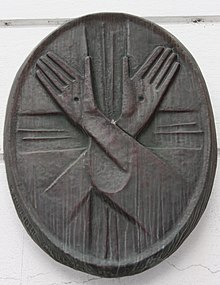
2.St. Francis of assisi-An Italian Roman Catholic friar and preacher. He founded the men's Order of Friars Minor, the women’s Order of Saint Clare, the Third Order of Saint Francis and the Custody of the Holy Land. Francis is one of the most venerated religious figures in history.
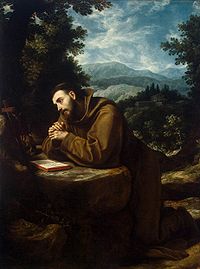
3.Pope-The Bishop of Rome and the leader of the worldwide Catholic Church. The primacy of the Roman bishop is largely derived from his role as the traditional successor to Saint Peter, to whom Jesus is supposed to have given the keys of Heaven and the powers of "binding and loosing", naming him as the "rock" upon which the church would be built. The current pope is Francis, who was elected on 13 March 2013, succeeding Benedict XVI.

4.St. Peter-Pope-According to the New Testament, Saint Peter was one of the Twelve Apostles of Jesus Christ, leaders of the early Christian Church. The Roman Catholic Church considers him to be the first Pope, ordained by Jesus in the "Rock of My Church" dialogue in Matthew 16:18. The ancient Christian churches all venerate Peter as a major saint and associate him with founding the Church of Antioch and later the Church in Rome, but differ about the authority of his various successors in present-day Christianity.
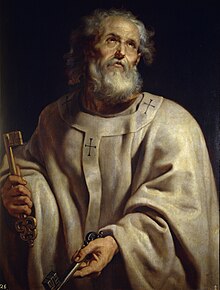
5.Key of Heaven-In the Gospel of Matthew 16:19, Jesus says to Peter, "I will give you the keys of the kingdom of heaven, and whatever you bind on earth shall be bound in heaven, and whatever you loose on earth shall be loosed in heaven."

6.Pope Benedict XVI-Pope of the Catholic Church from 2005 until his resignation on 11 February 2013,, citing a "lack of strength of mind and body" due to his advanced age. He is the first pope to resign since Pope Gregory XII in 1415, and the first to do so on his own initiative since Pope Celestine V in 1294. As pope emeritus, Benedict retains the style of His Holiness, and continues to dress in the papal color of white. He was succeeded by Pope Francis on 13 March 2013, and he moved into the newly renovated Mater Ecclesiae monastery for his retirement on 2 May 2013.
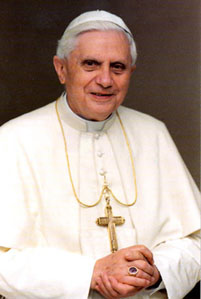
7.Pope Francis -he is the 266th Pope of the Roman Catholic Church. Following the resignation of Pope Benedict XVI on 28 February 2013. He chose Francis as his papal name in honor of Saint Francis of Assisi. Throughout his public life, Pope Francis has been noted for his humility, emphasis on God's mercy, concern for the poor, and commitment to interfaith dialogue. He is credited with having a humble, less formal approach to the papacy than his predecessors, for instance choosing to reside in the Domus Sanctae Marthae guesthouse rather than in the papal apartments of the Apostolic Palace used by his predecessors.
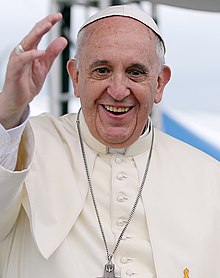
8.Stephen Crane(November 1, 1871 – June 5, 1900)- was an American poet, novelist, and short story writer. Prolific throughout his short life, he wrote notable works in the Realist tradition as well as early examples of American Naturalism and Impressionism. He is recognized by modern critics as one of the most innovative writers of his generation.
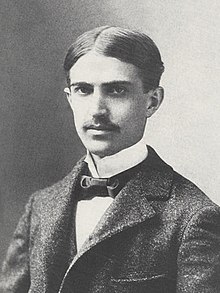
The Red Badge of Courage is a war novel by American by Stephen Crane (1871–1900). Taking place during the American Civil War, the story is about a young private of the Union Army, Henry Fleming, who flees from the field of battle.When his regiment once again faces the enemy, Henry acts as standard-bearer.
沒有留言:
張貼留言